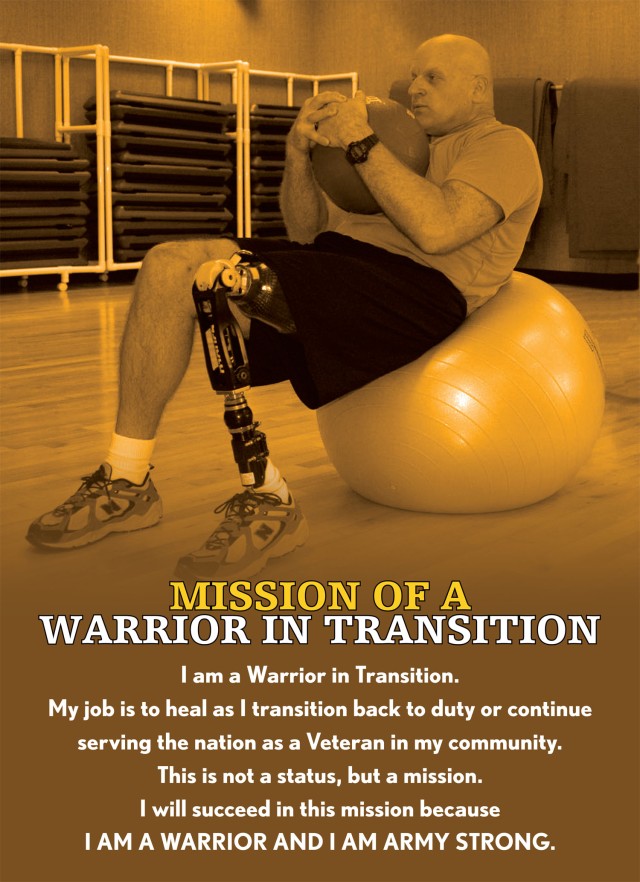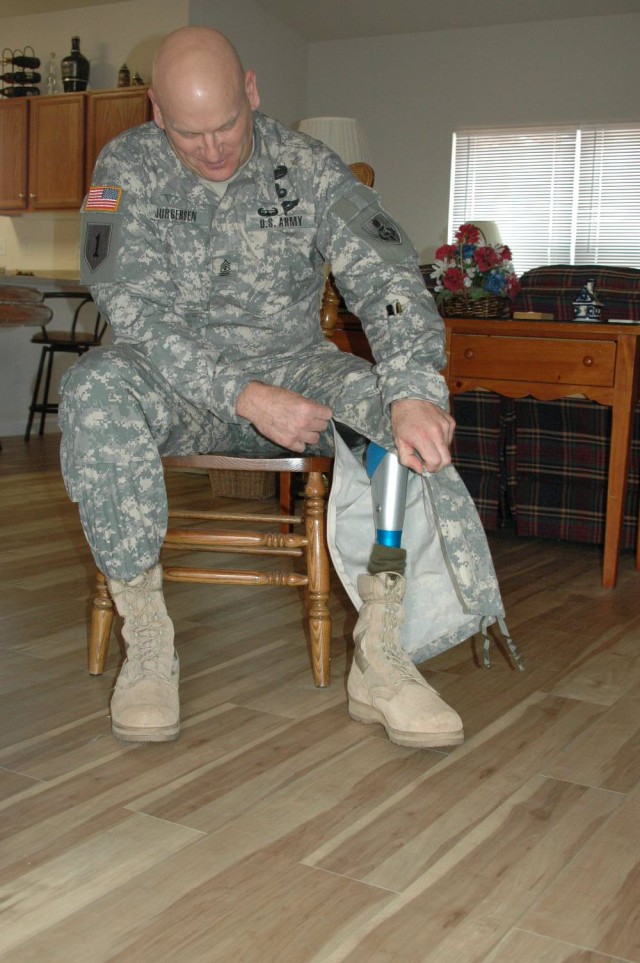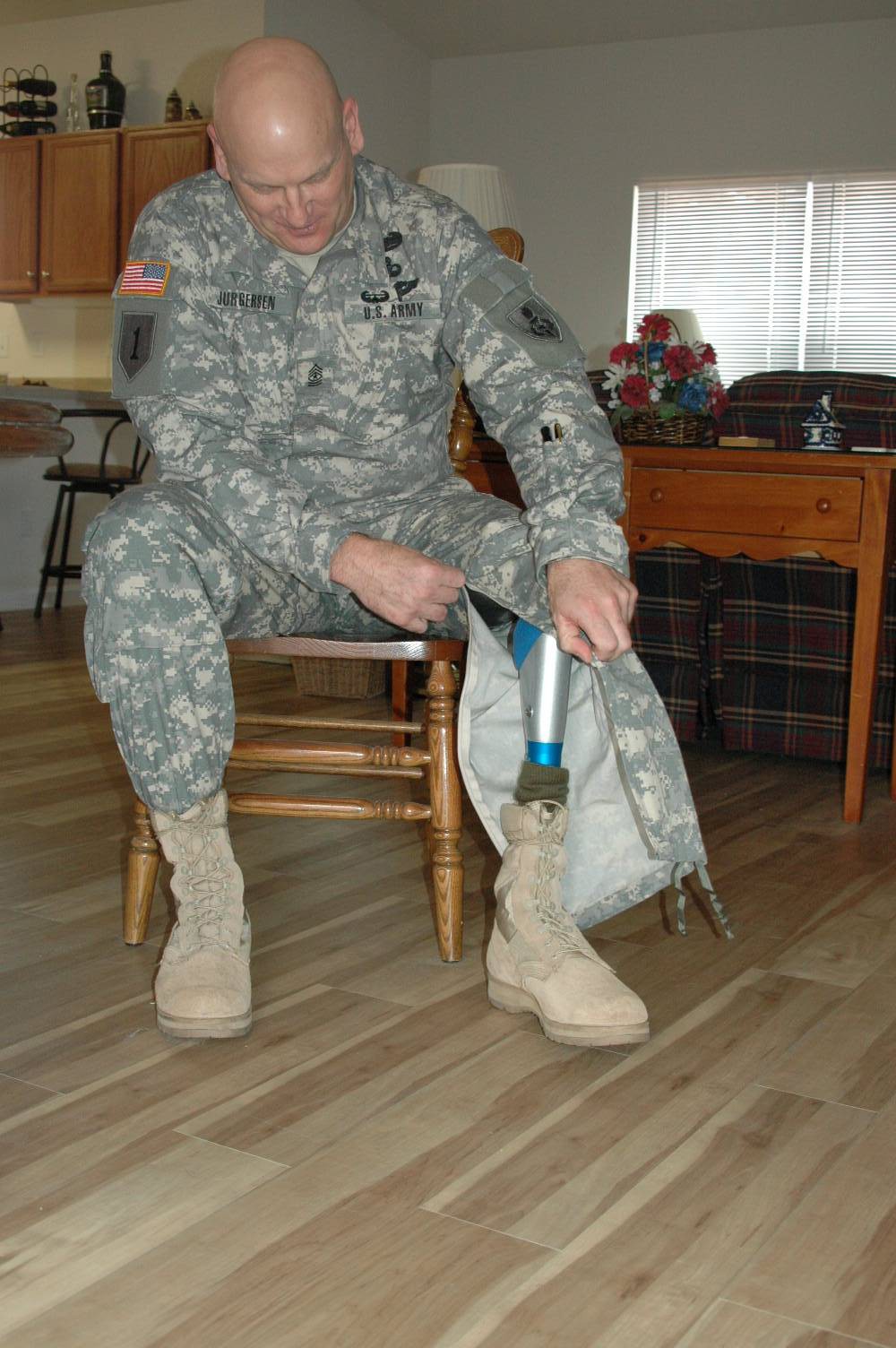FORT CARSON, Colo. - Four years after flat lining twice on the operating table in Balad, Iraq, the Army Wounded Warrior Program Sergeant Major is still battling with the question, "Why did I survive'"
Sgt. Maj. Brent Jurgersen, who celebrated his fourth "alive day" anniversary Jan. 26, still wonders why he survived after two rocket-propelled grenades struck his Humvee but his gunner, Sgt. William Scott Kinzer Jr., did not.
"I know they call it survivor's guilt, but whatever they call it, no matter how much you talk about it, it is still there," Jurgersen said.
Jurgersen's injuries from Jan. 26, 2005, included a compressed skull fracture, which left him with a traumatic brain injury; his left leg being amputated above the knee, severe damage to his right knee, his right hand had been fractured and burned, a finger nearly being ripped off and several shrapnel wounds and burns to other parts of his body.
Jurgersen was flown to Landstuhl Regional Medical Center, Germany, where he was stabilized and then to Walter Reed Army Medical Center in Washington, D.C., where he remained in critical condition. He regained consciousness five days later.
He recalls his wife standing at his bedside when he awoke from the coma.
"I remember a few key words as my wife explained my injuries," he said. "I remember the words your left leg had to be amputated. I remember hearing 'Sgt. Kinzer was killed.' I remember looking down at my body, and then looking away. I felt angry, I felt sad, and I felt disbelief. I thought my life was over, as I knew it."
Jurgersen remembered wishing he had died instead of his gunner.
"I was 42 years old. I had been married almost 22 years and raised two great kids. I had lived a good life," he said. "Sgt. Kinzer was so young. He was getting married; he had so much to do, so much to live for."
Jurgersen, who spent 18 months recovering at Walter Reed, said having experienced similar triumphs, setbacks and challenges has helped him relate to other Wounded Warriors.
"We share a bond only wounded warriors can share," he said. "We have bled on common ground; we have walked the same hallways. We have sweated doing similar physical therapy and occupational therapy exercises. We have shared our personal struggles in group and therapy sessions. We all have something in common -- our life was changed forever."
This bond helps wounded warriors to talk openly with Jurgersen, trusting the sergeant major to take their concerns to the leadership of the Army.
"(Sgt. Maj. Jurgersen) is a very genuine, open concerned person" when it comes to wounded warriors' quality of life and standard of care, said Sgt. 1st Class Paul Maas, a wounded warrior with the Fort Carson Mission Support Element. "Knowing what he's been through -- the pain and the physical therapy -- I know he can relate to my situation and what I am going through," which makes it easy to open up to the sergeant major, Maas said.
"I take this mission seriously, a mission that will not only help this generation of Soldiers and veterans, but others that will follow," Jurgersen said. "I take back my experiences and the experiences of other wounded warriors with the ultimate goal of helping others, whether that is with policy change, training of new advocates, or giving advice and counsel to our leaders."
Jurgersen was asked to become the AW2 Sergeant Major while attending the Sergeants Major Academy at Fort Bliss, Texas.
"Although I initially struggled with deferring my appointment to command sergeant major, I finally realized that it was not about what you put on your uniform, but what you do for our Soldiers and their Families."
The AW2's mission is to assist and advocate for the most severely wounded Soldiers and their Families, wherever they are located, for as long as it takes. The program has been continually growing and improving since being established nearly five years ago.
He said the Army took care of his Family and brought his wife and children to his bedside.
"I received the best medical care that one possibly can," he said. "Was there problems along the way' Yes, but I can proudly say that the Army has learned from those things, and has come a long way in taking care of our wounded warriors and their Families."
The evolution of the AW2 program includes the implementation of the congressionally-mandated Recovery Coordination Program for all Armed Services Nov. 24. Jurgersen said AW2 has the lead for implementing the program across the Army. The program will assign recovery care coordinators to assist seriously wounded Soldiers and their Families with severe needs. Similar to AW2 advocates, they will coordinate with the Warrior Transition Unit Triad of Care and other care providers on all issues affecting the Soldier and Family. Additionally, they will help develop and oversee a comprehensive recovery plan that will ensure the Soldier and Family remain on course to as complete a recovery as possible and reintegration into their communities.
Jurgersen said the focus should always be on the Soldiers and their Families. "It is about making a difference, one Soldier at a time, one veteran at a time, and one Family at a time."
He said the most important point he emphasizes to each wounded warrior he meets is that they have to be patient.
"Their mission is to heal; their mission is to get better, physically and mentally. They have to set goals, but they need to be prepared for setbacks. It is how they handle the setbacks that will make them who they are."
He stressed the importance for wounded warriors to prepare for the future, whether that is returning to active duty or transitioning to life as a civilian. The message to the Families is similar, he said, they, too, have to heal. "You have been injured also, maybe not physically, but emotionally, and you need to heal. You need to recover so you can continue your life and continue to take care of your loved one."
Jurgersen said he is continually "amazed and humbled" by the wounded warriors he has met since becoming the AW2 Sergeant Major a year and a half ago.
"Every time I meet one of our wounded warriors, I am humbled," Jurgersen said. "I am in awe of their bravery, their strength, their passion, and their commitment. We have some amazing great men and women out there. It is an honor to serve alongside of them, to listen to their stories, to share a hug with them, to share a laugh or tear with them, to be part of their lives."
The sergeant major is thankful to his Soldiers and the doctors who performed lifesaving measures to save his life that day in Iraq.
"I only wish I could meet every one of those people so I could personally thank them," he said. "But at the end of the day, I lived. I now just have to figure out why that was, and what to do with it."




Social Sharing